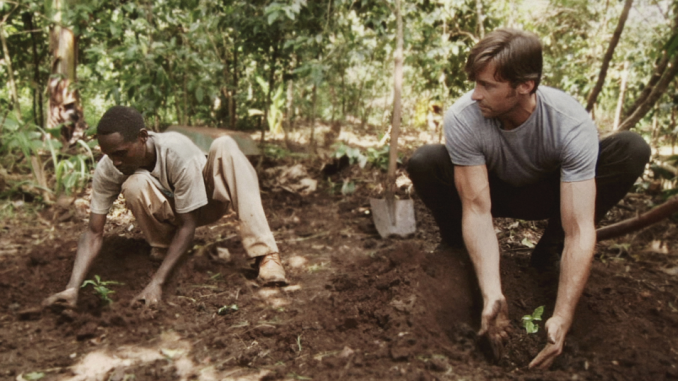
Hugh Jackman carries documentary about specialty coffee with Dukale’s Dream, in theaters now
BY ASHLEY RODRIGUEZ
SPECIAL TO BARISTA MAGAZINE
Dukale’s Dream recounts a full circle excursion of what it means to provide aid and highlight poverty and inequity issues in a meaningful way. This feature-length documentary, which opens in select theaters on Friday, and will be available by Video on Demand on July 14, follows Hugh Jackman, an actor most famously known as Wolverine in the X-Men saga, during a trip to Ethiopia as an ambassador for World Vision Australia, and the relationship he develops with a local coffee farmer.

Jackman and his wife, Deborra-Lee Furness, are taken to one of the communities that World Vision has given assistance to, and there they meet and spend time with Dukale, a young coffee producer in a small community in the Yirgacheffe region.
Here’s the official trailer for Dukale’s Dream:
In between shots of Jackman following Dukale and helping him till the land, we are looped into a continuous discussion he has about wealth and economic inequity with Jeffrey Sachs, a Colombia University economist and author of The End of Poverty. After his trip, Jackman returns to New York and begins to question how the coffee Dukale grows gets to the hands of consumers, and how cognizant people are of where their coffee comes from or if it’s bought fairly. In the end, the movie comes back to Jackman three years later, where he has opened up his own coffee company selling coffee from Dukale’s farm.

Between beautiful shots of the Ethiopian countryside and honest interviews with Jackman and Dukale, this film’s strength ultimately lies in its distinction between aid and development. As Assefa Tofu, a community development specialist for World Vision, points out during the movie, œAid is just to pass one night or a few days, but the development is long lasting. The documentary highlights the ways in which organizations like World Vision provide longlasting assistance, like giving Dukale’s family a methane burner both to recycle manure on the farm and to discourage use of other fuel sources, primarily wood from surrounding trees.

The film goes one step further, and documents how development doesn’t just happen on Dukale’s farm, but continues back at home for Jackman. He uses his resources to open a coffee company called Laughing Man in order to both provide a market for Dukale’s coffee and open a discussion with consumers about the conditions of coffee farmers. Coffee professionals watching this movie might question how effective Jackman is at achieving this goal. However, taking the movie in for its larger message and its mainstream focus ”the target audience is certainly not coffee professionals ”the film makers, with Jackman serving primarily as their story teller, do a wonderful job of documenting real issues facing poverty-stricken countries and tangible solutions throughout the consumer chain.
Dukale’s Dream will premiere June 4th at the SVA Theatre in New York, and will be released at a select number of movie theaters around the country June 5th. It will also be available by Video on Demand July 14th.
ABOUT THE AUTHOR
 Ashley Rodriguez thought that she’d take a break from teaching middle school science and putz around in a coffee shop for a few months. She ended up digging it way more than teaching (and was vaguely better at it). After spending 5 years making coffee in New York, she now works for Sightglass Coffee in San Francisco.
Ashley Rodriguez thought that she’d take a break from teaching middle school science and putz around in a coffee shop for a few months. She ended up digging it way more than teaching (and was vaguely better at it). After spending 5 years making coffee in New York, she now works for Sightglass Coffee in San Francisco.

